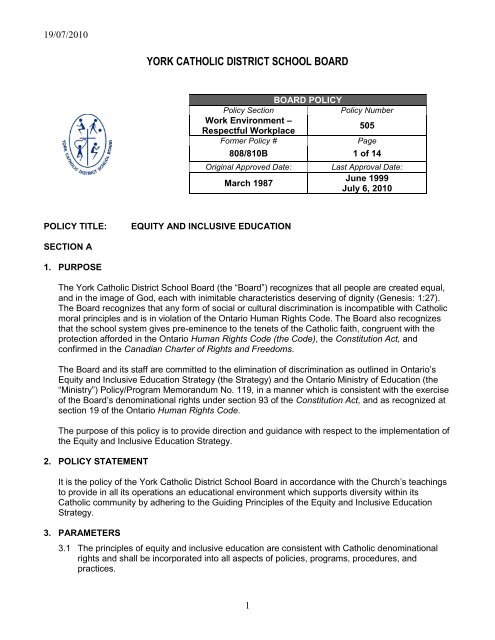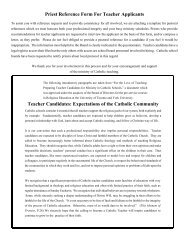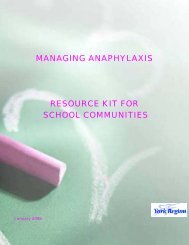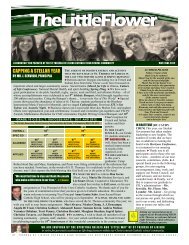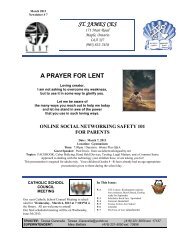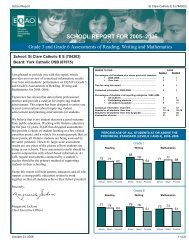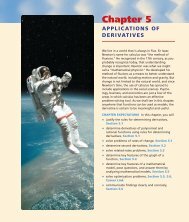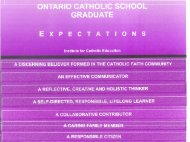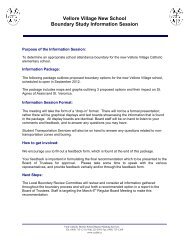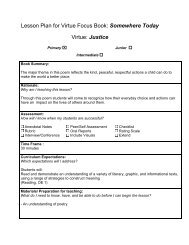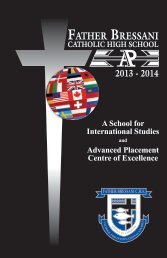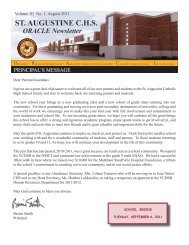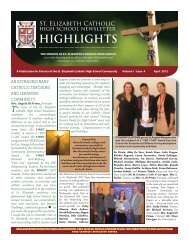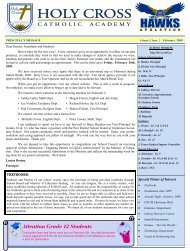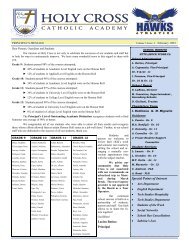Download Policy - the York Catholic District School Board
Download Policy - the York Catholic District School Board
Download Policy - the York Catholic District School Board
Create successful ePaper yourself
Turn your PDF publications into a flip-book with our unique Google optimized e-Paper software.
19/07/20103.2 Partnerships with all members of our diverse <strong>Catholic</strong> community shall be established andmaintained so that <strong>the</strong> perspectives and experiences of all pupils, families, and employees arerecognized and <strong>the</strong> specific learning needs of all pupils are met.3.3 <strong>School</strong>s shall implement an inclusive curriculum based on <strong>Catholic</strong> values and reviewresources, instruction, and assessment and evaluation practices in order to identify andaddress discriminatory biases so that each pupil may maximize her or his learning potential.3.4 Freedom of religion and freedom from discriminatory or harassing behaviours based onreligion is valued by <strong>the</strong> <strong>Board</strong>.3.5 Every person within <strong>the</strong> school community is entitled to a respectful, positive and Christcentredschool climate and learning environment, free from all forms of discrimination andharassment.3.6 The entire school community, shall be provided with opportunities to acquire <strong>the</strong> knowledge,skills, attitudes, and behaviours needed to identify and eliminate discriminatory biases andsystemic barriers under <strong>the</strong> Code.3.7 The <strong>Board</strong> shall assess and monitor <strong>the</strong> progress in implementing <strong>the</strong> Strategy as required.4. RESPONSIBILITIES4.1 Director of Education/DesignateTo oversee <strong>the</strong> development and implementation of <strong>the</strong> policy and guidelines.To ensure system awareness and compliance with this policy.To report annually on <strong>the</strong> progress of <strong>the</strong> implementation of this policy.4.2 Superintendents of Education/Senior Managers/<strong>School</strong> AdministratorsTo ensure system awareness and compliance with this policy.To implement <strong>the</strong> Equity and Inclusive Education Strategy.To ensure <strong>the</strong> prompt investigation and satisfactory resolution of claims of humanrights violations.4.3 <strong>School</strong>sTo develop and implement strategies, programs and action plans in compliance with<strong>the</strong> equity and inclusive education policy and guidelines.4.4 Community PartnersTo comply with this policy in all interactions with any and all agents of <strong>the</strong> <strong>York</strong><strong>Catholic</strong> <strong>District</strong> <strong>School</strong> <strong>Board</strong>.4.5 EmployeesTo be aware of and comply with this policy and guidelines4.6 Parents/PupilsTo inform school administrators of <strong>the</strong> need for accommodations (educational orreligious) as required by this policy and guidelines.To support <strong>the</strong> development of values that support and respect <strong>the</strong> dignity of all.2
19/07/20105. DEFINITIONS5.1 Guiding Principles (of <strong>the</strong> Equity and Inclusive Education Strategy)Equity and inclusive education:Is a foundation of excellence;Meets individual needs;Identifies and eliminates barriers;Promotes a sense of belonging;Involves <strong>the</strong> broad community;Builds on and enhances previous and existing initiatives;Is demonstrated throughout <strong>the</strong> system;Is congruent with <strong>Catholic</strong> teaching5.2 DiscriminationUnfair or prejudicial treatment of individuals or groups on <strong>the</strong> basis of race, ancestry,place of origin, colour, ethnic origin, citizenship, creed, sex, sexual orientation, age,marital status, family status, or disability, as set out in <strong>the</strong> Ontario Human Rights Code,or on <strong>the</strong> basis of o<strong>the</strong>r, similar factors.Discrimination, whe<strong>the</strong>r intentional or unintentional, has <strong>the</strong> effect of preventing orlimiting access to opportunities, benefits or advantages that are available to o<strong>the</strong>rmembers of society.Discrimination may be evident in organizational and institutional structures, policies,procedures, and programs, as well as in <strong>the</strong> attitudes and behaviours of individuals.5.3 DiversityThe presence of a wide range of human qualities and attributes within a group,organization, or society. The dimensions of diversity include but are not limited to,ancestry, culture, ethnicity, gender, gender identity, language, physical and intellectualability, race, religion, sex, sexual orientation, and socio-economic status.5.4 EquityA condition or state of fair, inclusive, and respectful treatment of all people. Equity doesnot mean treating people <strong>the</strong> same without regard for individual differences.5.5 Inclusive EducationEducation that is based on <strong>the</strong> principles of acceptance and inclusion of all pupils.Pupils see <strong>the</strong>mselves reflected in <strong>the</strong>ir curriculum, <strong>the</strong>ir physical surroundings, and <strong>the</strong>broader environment where diversity is honoured and all individuals are respected.5.6 Ontario Human Rights Code („<strong>the</strong> Code”)A provincial law that gives everyone equal rights and opportunities, withoutdiscrimination, in specific areas such as education, jobs, housing, and services. Thegoal of <strong>the</strong> Code is to address and ultimately prevent discrimination and harassment.Note: An expanded Glossary of terms is available at <strong>the</strong> following link:http://www.edu.gov.on.ca/eng/policyfunding/inclusiveguide.pdf3
19/07/20106. CROSS REFERENCESEducation ActCanadian Charter of Rights and Freedoms.Equity and Inclusive Education in Ontario <strong>School</strong>s: Guidelines for <strong>Policy</strong> Development andImplementation, Ontario’s Equity and Inclusive Education Strategy (<strong>the</strong> Strategy)<strong>Policy</strong>/Program Memorandum No. 119 “Developing and Implementing Equity and InclusiveEducation Policies in Ontario <strong>School</strong>s”Constitution Act, 1982Ontario Human Rights Code (<strong>the</strong> Code)Ontario <strong>Catholic</strong> <strong>School</strong> Graduate ExpectationsApproval by <strong>Board</strong>DateEffective DateDateRevision DatesDateReview Date June 2015Date4
19/07/20101.9. Investigate in a thorough and timely manner any claims of discrimination and/orharassment and take appropriate action consistent with <strong>the</strong> principles of <strong>the</strong> Code.Our <strong>School</strong>s will:1.10. Review existing school policies and practices, to determine that <strong>the</strong>y reflect <strong>the</strong>principles of equity and inclusive education.1.11. Extend, develop, and implement strategies to actively engage pupils, parents, families,and <strong>the</strong> wider community in <strong>the</strong> review, development, and implementation of initiatives tosupport and promote equity and inclusive education.1.12. Implement <strong>Board</strong> equity and inclusive education policies, programs and schoolimprovement plans consistent with <strong>the</strong> Code and that reflect <strong>the</strong> needs of <strong>the</strong>ir diverse<strong>Catholic</strong> school community.2. SHARED AND COMMITTED LEADERSHIPPurpose:The <strong>Board</strong> subscribes to an informed leadership philosophy that inspires, empowers, andsupports all stakeholders in our <strong>Catholic</strong> community to join toge<strong>the</strong>r to implement institutionalpractices and behaviours that cultivate equity and inclusion.The <strong>Board</strong> is committed to improving student achievement and to closing achievement gaps forpupils by identifying, addressing, and removing all barriers and forms of discrimination.The <strong>Board</strong> recognizes <strong>the</strong> critical connection between student leadership and improved studentachievement and will strive to include student voice in all aspects of <strong>the</strong> implementation ofequity and inclusive education.In accordance with <strong>the</strong> Ministry‟s Ontario Leadership Strategy, <strong>Board</strong> and school leaders willencourage and promote a collaborative approach to all dimensions of equity and inclusiveeducation, which ensures <strong>the</strong> participation of pupils, parents, parishes, employees,associations, unions, colleges and universities, service organizations and o<strong>the</strong>r communitypartners.Parameter:The <strong>Board</strong> is committed to establishing and maintaining partnerships with all members of ourdiverse <strong>Catholic</strong> community so that <strong>the</strong> perspectives and experiences of all pupils arerecognized and <strong>the</strong>ir needs are met.The <strong>Board</strong> will:Share in <strong>the</strong> life and mission of <strong>the</strong> Church by developing a system plan to build and sustain<strong>Board</strong> and staff capacity in <strong>the</strong> areas of equity and inclusive education in curriculum andinstruction, human resources and governance.2.1. Appoint a contact person to liaise with <strong>the</strong> Ministry and o<strong>the</strong>r <strong>Board</strong>s to share effectivepractices and resources and identify challenges in implementation.2.2. Provide ongoing education and training for pupils, administrators, teachers (includingguidance counsellors), support staff and trustees in implementing equity and inclusiveeducation and leadership initiatives.2.3. Establish selection criteria for leadership positions that include demonstratedcommitment, knowledge and skills related to equity and inclusive education6
19/07/2010implementation and inclusive leadership, and consistent with proactive Codecompliance.2.4. Provide ongoing training for all staff that reflects comprehensive attention to <strong>the</strong>principles of human rights and <strong>the</strong>ir fundamental role in an equitable and inclusiveenvironment.2.5. Strive to ensure that members of communities that are underserved and /or marginalizedare included in shared leadership opportunities.Our <strong>School</strong>s will:2.6. Establish a collaborative culture where <strong>the</strong> collective capacities and voices of allstakeholders are used to develop and implement equity and inclusive education goals.2.7. Promote pupil leadership opportunities with a focus on equity and social justice issues.2.8. Develop and promote initiatives that support and promote diversity of pupil voice andexperience.2.9. Demonstrate leadership in setting <strong>the</strong> tone for <strong>the</strong> positive and proactive implementationof <strong>the</strong> Equity Strategy within <strong>the</strong> school.3. SCHOOL-COMMUNITY RELATIONSHIPSPurpose:The <strong>Board</strong> recognizes that <strong>the</strong> effective review, development, implementation and monitoring ofequity and inclusive education policies and practices requires <strong>the</strong> involvement of all members of<strong>the</strong> entire <strong>Catholic</strong> school community. The <strong>Board</strong> fur<strong>the</strong>r recognizes <strong>the</strong> importance of engagingspecialized expertise in developing and implementing its equity and inclusive education policy.The <strong>Board</strong> will seek collaboration with and active engagement from pupils, parents, staff andcommunity partners to create and sustain a positive school climate reflective of <strong>Catholic</strong> valuesthat supports pupil achievement.The <strong>Board</strong> will identify, examine, and remove any barriers that exist, that are part of systemicdiscrimination under <strong>the</strong> Code, and that prevent full, participatory, school-community relations.ParameterThe <strong>Board</strong> is committed to establishing and maintaining partnerships with all members of ourdiverse <strong>Catholic</strong> community so that <strong>the</strong> perspectives and experiences of all pupils, families, andemployees are recognized.The <strong>Board</strong> will:3.1. Develop a database that establishes <strong>the</strong> diversity of communities.3.2. Review and/or initiate tools to determine stakeholders‟ views on school environment andact upon relevant next steps.3.3. Take proactive steps that will facilitate existing committees to represent <strong>the</strong> diversity of<strong>the</strong> wider community.3.4. Review and deepen existing community partnerships to ensure that <strong>the</strong>y reflect <strong>the</strong>principles of equity and inclusive education.7
19/07/20103.5. Expand community efforts to foster new partnerships that engage a diverse crosssectionof pupils, parents, staff, community agencies and services and business groupsto ensure inclusion.3.6. Establish processes to identify and address systemic barriers that limit or preventrepresentation and access to <strong>Board</strong> initiatives.3.7. Identify under-represented communities and facilitate <strong>the</strong>ir participation and involvementin <strong>Board</strong> activities3.8. Ga<strong>the</strong>r and use <strong>the</strong> knowledge, skills, and experience of <strong>Board</strong> community partners toenrich <strong>the</strong> total educational and career experiences of staff, pupils, and volunteers.Our <strong>School</strong>s will:3.9. Review existing community partnerships to ensure that <strong>the</strong>y reflect <strong>the</strong> diversity of <strong>the</strong>broader community.3.10. Invite and support representation of diverse groups on school committees, including <strong>the</strong>school improvement planning process.3.11. Engage school stakeholders in community forums.3.12. Reflect <strong>the</strong> approaches described above in <strong>the</strong>ir outreach to <strong>the</strong> broader community.4. INCLUSIVE CURRICULUM AND ASSESSMENT PRACTICESPurpose:The <strong>Board</strong> endorses inclusive curriculum and assessment practices that consider both <strong>the</strong>content and context of curriculum in <strong>the</strong> classroom and in <strong>the</strong> lives of <strong>the</strong> pupils. Educators mustconsider both <strong>the</strong> content of <strong>the</strong> curriculum and how it is received as pupils learn both <strong>the</strong>explicit and implicit curricula. Inclusive curriculum in content, context and methodology ofdelivery seeks to recognize our commitment to <strong>Catholic</strong> values and our respect for all pupils,regardless of race and ethnicity, gender, place of origin, religion, cultural and linguisticbackground, social and economic status, sexual orientation, age, and ability/disability.Pupils must be represented in <strong>the</strong> curriculum and in assessment and evaluation. Effectiveassessment and evaluation includes <strong>the</strong> use of best practices that reflect differentiatedinstruction and assessment. These would include multiple opportunities for assessment and coconstructionof learning goals and success criteria.Parameter:The <strong>Board</strong> is committed to implementing an inclusive curriculum based on <strong>Catholic</strong> values andto reviewing resources, instruction, and assessment and evaluation practices in order to identifyand address discriminatory biases so that each pupil may maximize her or his learning potential.The <strong>Board</strong> will:4.1. Review pupil assessment and evaluation policies and practices to identify and addresssystemic bias that may exist in <strong>the</strong> way pupils‟ work is assessed and evaluated in orderto reduce <strong>the</strong> achievement gap. The principles of such a review will be consistent with<strong>the</strong> Code.4.2. Support <strong>the</strong> review and implementation of resources and strategies that promote schoolwideequity and inclusive education policies and practices specifically addressing areasof discrimination (e.g., race, ancestry, place of origin, colour, ethnic origin, citizenship,creed, sex, sexual orientation, age, marital status, family status or disability).8
19/07/2010Our <strong>School</strong>s will:4.3. Review pupil assessment and evaluation policies and practices to identify and addresssystemic bias that may exist in <strong>the</strong> way pupils‟ work is assessed and evaluated; <strong>the</strong>principles of such a review will be consistent with <strong>the</strong> Code.4.3.1 Ensure that assessment and evaluation support growth and learning, with <strong>the</strong>belief that each and every pupil can achieve and be successful given <strong>the</strong>appropriate time and support.4.3.2 Provide education and training based on <strong>the</strong> belief that all pupils can learn andensure that it is reflected in <strong>the</strong> expectations of assessment and evaluationpractices, counselling about available program options, and o<strong>the</strong>r counsellingpractices.4.3.3 Use a variety of assessment strategies and instruments to inform short- andlong-range planning to reduce gaps in pupil achievement and improve pupillearning.4.3.4 Provide multiple opportunities for assessment (self, peer, teacher, pupil ledconferencing and /or parent/pupil and teacher interviews).4.3.5 Adjust instruction based on <strong>the</strong> results of formative assessment and providespecific and timely feedback to promote fur<strong>the</strong>r learning.4.3.6 Ensure consistent monitoring of <strong>the</strong> growth of pupils who are on IndividualEducation Plans and/or are English Language Learners to ensure that <strong>the</strong>specific needs of pupils are addressed through <strong>the</strong> accuracy of appropriateprogramming, modifications and accommodations based on best practices ininstruction and assessment.4.3.7 Utilize varied opportunities and techniques to enhance pupil assessment. (eg.an oral response for a reading comprehension task or a mind map in lieu of anessay or a dramatic performance that demonstrates <strong>the</strong> pupil‟s learning).4.4. Implement instructional strategies and classroom practices that promote school-wideequity and inclusive education policies and practices;4.4.1 Ensure collaborative learning structures recognizing <strong>the</strong> variety of learningstyles and multiple intelligences.4.4.2 Ensure access and use of assistive technologies for pupils who requireaccommodations to support achievement and success.4.4.3 Engage pupils as active participants in <strong>the</strong>ir learning and assessment (forexample, pupils seeing and hearing <strong>the</strong>mselves in <strong>the</strong> curriculum; genderspecific teaching practices; culturally relevant and responsive pedagogy;research based practices in assessment and evaluation).4.4.4 Review and reflect upon classroom practices and revise <strong>the</strong>m as needed tohelp ensure that <strong>the</strong>y are aligned with school goals and <strong>the</strong> school-wide equityand inclusive education policy.4.4.5 Ensure that instructional resources and strategies are in accordance with<strong>Catholic</strong> teachings, <strong>the</strong> provisions of <strong>the</strong> Code and <strong>the</strong> principles of equity andinclusivity.4.4.6 Provide opportunities for pupils to experience people of different races,genders, and ages in non-stereotypical settings, occupations, and activities;9
19/07/2010explore <strong>the</strong> roles and contributions of all peoples in Canada and <strong>the</strong> factors thatshaped <strong>the</strong>se roles; and facilitate open discussions about social justice within<strong>the</strong> school, <strong>the</strong> community and society.4.5 Ensure that parents (and pupils where appropriate) are invited to attend and be activelyinvolved in identification and placement decisions, including those required by <strong>the</strong>Identification, Placement and Review Committee.5 RELIGIOUS ACCOMMODATIONPurpose:The <strong>Board</strong>, in keeping with its commitment to <strong>the</strong> mission of <strong>the</strong> Church, provides a learning andworking environment in which all individuals are treated with respect and dignity regardless ofrace, ancestry, place of origin, colour, ethnic origin, citizenship, creed, sex, sexual orientation,age, record of offences, marital status, family status or disability, in accordance with <strong>the</strong> OntarioHuman Rights Code and all o<strong>the</strong>r pertinent legislation.Within <strong>the</strong> framework of <strong>the</strong> gospel values and traditions, <strong>the</strong> <strong>Board</strong> will provide reasonableaccommodation for <strong>the</strong> religious beliefs and practices of pupils and staff, while also protectingits denominational rights. (Refer to Appendix A)Parameter:The <strong>Board</strong> is committed to <strong>the</strong> values of freedom of religion and freedom from discriminatory orharassing behaviour based on religion and will take all reasonable steps to provide religiousaccommodations within <strong>the</strong> legal rights afforded to <strong>the</strong> <strong>Catholic</strong> school system.The <strong>Board</strong> will:5.1 Consult with a variety of individuals and groups who represent <strong>the</strong> religious diversity of<strong>the</strong> <strong>Board</strong> in <strong>the</strong> implementation of this policy.5.2 Inform pupils and <strong>the</strong>ir parents/guardians and staff of <strong>the</strong>ir right to requestaccommodation for religious beliefs and practices.5.3 Prepare a religious accommodation guideline in keeping with <strong>the</strong> Code (see Appendix A).5.4 Provide religious accommodation for pupils and staff, where reasonable and consistentwith <strong>the</strong> Code and <strong>Catholic</strong> denominational rights.Our <strong>School</strong>s will:5.5 Implement religious accommodation practices that are in alignment with <strong>the</strong> <strong>Board</strong>religious accommodation guideline.6 SCHOOL CLIMATE AND THE PREVENTION OF DISCRIMINATION AND HARASSMENTPurpose:The <strong>Board</strong> recognizes that a positive Christ-centered school climate, free from discriminating orharassing behaviour, provides a safe and welcoming learning and working environment whereall members of <strong>the</strong> school community feel safe, welcomed, respected and celebrated.10
19/07/2010The principles of equity and inclusive education support a healthy school environment andpromote positive pupil behaviour. These principles are consistent with <strong>Catholic</strong> doctrine andmust be considered and applied in employing consequences for inappropriate behaviourparticularly in <strong>the</strong> context of mitigating and o<strong>the</strong>r factors.Parameter:The <strong>Board</strong> is committed to <strong>the</strong> principle that every person within <strong>the</strong> school community isentitled to a respectful, positive and Christ-centred school climate and learning environment,free from all forms of discrimination and harassment.The <strong>Board</strong> will:6.1 Implement strategies to identify and remove discriminatory barriers that limit engagementof pupils, parents, and <strong>the</strong> community, so that diverse groups and <strong>the</strong> broader communityhave representation and access to <strong>Board</strong> initiatives.6.2 Implement procedures that will enable pupils and staff to report incidents of discriminationand harassment safely and ensure a timely and appropriate response.6.3 Cultivate a climate in which excellence is continually promoted and respect for allpermeates <strong>the</strong> environment.6.4 Communicate and reinforce <strong>the</strong> expectations that administrators will use progressivediscipline and professional discretion when dealing with inappropriate behaviour, andaccommodate pupils with disabilities in those circumstances.Our <strong>School</strong>s will:6.5 Ensure that school codes of conduct reflect <strong>the</strong> <strong>Board</strong> Code of Conduct and wherenecessary, are revised to address issues of discrimination, and harassment.6.6 Ensure <strong>the</strong> use of progressive discipline and restorative justice.6.7 Welcome, respect and validate <strong>the</strong> contributions of all pupils, parents, and o<strong>the</strong>r membersof <strong>the</strong> school community.6.8 Strive to meet <strong>the</strong> learning needs of every pupil and inspire all pupils to succeed in aculture of high expectations for learning.6.9 Ensure that school codes of conduct reflect <strong>the</strong> needs of <strong>the</strong> diverse <strong>Catholic</strong> communityserved by <strong>the</strong> school and are developed with active consultation.6.9 Review and/or develop equity and inclusive education guidelines and procedures toaddress issues of discrimination and harassment as <strong>the</strong>y may apply to pupils, staff, ando<strong>the</strong>rs in <strong>the</strong> <strong>Catholic</strong> community.6.10 Ensure that procedures established in keeping with <strong>the</strong> Code will enable pupils and staffto report incidents of harassment and discrimination safely and to have confidence that<strong>the</strong>y will receive a timely and appropriate response.6.11 Ensure that all information about <strong>the</strong> new or revised procedures involving equity andinclusive education is communicated to all pupils, staff, families, and o<strong>the</strong>rs in <strong>the</strong> schoolcommunity.11
19/07/20107. PROFESSIONAL LEARNINGPurposeThe <strong>Board</strong> celebrates and affirms <strong>the</strong> role of staff in cultivating a learning environment wherepupils maximize <strong>the</strong>ir learning potential, grow in <strong>the</strong>ir knowledge of <strong>Catholic</strong>ism and developvalues that support and respect <strong>the</strong> dignity of all. As such, ongoing professional learning isessential to nurture a foundation for <strong>the</strong> development of <strong>Catholic</strong> values, ecclesial and culturalidentity, human rights education and effective instructional practices.Parameter:The <strong>Board</strong> is committed to providing <strong>the</strong> entire school community with opportunities to acquire<strong>the</strong> knowledge, skills, attitudes, and behaviours needed to identify and eliminate discriminatorypractices and systemic barriers under <strong>the</strong> Code.The <strong>Board</strong> will:7.1 Provide resources and ongoing opportunities for pupils, administrators, teachers, supportand <strong>Board</strong> staff, as well as trustees, to participate in equity and inclusive educationtraining and leadership initiatives:7.1.1 Provide equity and diversity training that promotes respect, courtesy and virtuousconduct in all interactions, (including training in prevention and early interventionstrategies).7.1.2 Ensure that training includes information on diversity, and promotes a deeperunderstanding of exceptionalities and mitigating factors.7.1.3 Train staff to identify and mitigate discipline for pupils with disabilities whenconfronted with discriminatory issues.7.2 Ensure that <strong>the</strong> principles of equity and inclusive education are modelled andincorporated in professional learning programs.7.3 Support schools‟ review of classroom strategies that promote school-wide equity andinclusive education policies and practices.7.4 Identify a <strong>Board</strong> equity and inclusive education contact to liaise with <strong>the</strong> Ministry ofEducation and o<strong>the</strong>r <strong>Board</strong>s in order to share promising practices, exemplary resourcesand challenges.Our <strong>School</strong>s will:7.5 Review classroom practices and revise as needed to ensure that <strong>the</strong>y are aligned withand reflect school-wide equity and inclusive education expectations.7.6 Encourage and support pupils in <strong>the</strong>ir efforts to promote social justice, equity, inclusion,and diversity in schools and classrooms.7.7 Develop and implement initiatives that will promote school-wide equitable practices.12
19/07/20108 ACCOUNTABILITY AND TRANSPARENCYPurpose:The <strong>Board</strong> acknowledges and assumes <strong>the</strong> responsibility for its policies, actions, and decisions.In <strong>the</strong> pursuit of greater transparency and accountability, <strong>the</strong> <strong>Board</strong>, in respectful collaborationand communication with <strong>the</strong> whole <strong>Catholic</strong> school community, will report on its goals andprogress in <strong>the</strong> areas of policy review, school improvement planning and <strong>the</strong> implementation of<strong>the</strong> Strategy.Parameter:The <strong>Board</strong> is committed to: assessing and monitoring its progress in implementing <strong>the</strong> Strategy;to embedding <strong>the</strong> principles of Equity and Inclusive Education into all <strong>Board</strong> policies, programs,guidelines and practices; and to communicating <strong>the</strong>se results to <strong>the</strong> community.The <strong>Board</strong> will:8.1 Embed <strong>the</strong> principles of equity and inclusive education into all <strong>Board</strong> policies, procedures,programs, guidelines, and practices.8.2 Actively communicate <strong>the</strong> equity and inclusive education policy to pupils, teachers,parents, staff, school councils, community partners, and volunteers and post it on <strong>the</strong><strong>Board</strong>‟s website.8.3 Seek and use feedback to improve <strong>the</strong> Equity and Inclusive Education policy andguidelines.8.4 Engage <strong>Board</strong> and school teams in school improvement planning with particularemphasis on: using data to identify and remove barriers to pupil achievement; raisingawareness about discriminatory practices; and encouraging conversations andcollaborative actions about equity and inclusion.8.5 Establish processes to monitor progress and assess effectiveness of policies, programs,and procedures.8.6 Report on <strong>the</strong> progress of implementation of <strong>the</strong> Strategy and its impact on pupilachievement using specific criteria.8.7 Ensure <strong>the</strong> transparency of <strong>the</strong> Identification Placement and Review Committee (IPRC)process and support parents through this process.Our <strong>School</strong>s will:8.8 Report pupil achievement data annually to <strong>the</strong> <strong>Board</strong> and intervene at all levels to ensure<strong>the</strong> achievement and success of all pupils.8.9 Develop and communicate evidence based school improvement plans that are alignedwith <strong>the</strong> Strategy.8.10 Use self-reflection and self-assessment tools to determine <strong>the</strong> effectiveness of <strong>the</strong>school‟s equity and inclusive education procedures and plans.13
Appendix ARELIGIOUS ACCOMMODATION GUIDELINEINTRODUCTIONThe <strong>York</strong> <strong>Catholic</strong> <strong>District</strong> <strong>School</strong> <strong>Board</strong> (<strong>the</strong> <strong>Board</strong>) believes in <strong>the</strong> dignity of all people and <strong>the</strong>irequality as children of God. The <strong>Board</strong> acknowledges <strong>the</strong> importance of freedom of religion andstrives to recognize, value and honour <strong>the</strong> many customs, traditions and beliefs that make upsociety at large, as well as <strong>the</strong> <strong>Catholic</strong> community.Freedom of religion is an individual right and a collective responsibility. The <strong>Board</strong> commits towork with <strong>the</strong> community it serves to foster an inclusive learning environment that promotesacceptance and protects individuals from discrimination and harassment on <strong>the</strong> basis of <strong>the</strong>irreligion.The <strong>Board</strong> is committed to providing an environment that is inclusive and free of barriers.Accommodation will be provided in accordance with <strong>the</strong> principles of dignity, and inclusion. The<strong>Board</strong> will work cooperatively, and in a spirit of respect, with all partners in <strong>the</strong> accommodationprocess.The purpose of <strong>the</strong> Religious Accommodation Guideline is to reflect <strong>the</strong> <strong>Board</strong>’s commitment toprotecting freedom of religion in accordance with <strong>the</strong> teachings of <strong>the</strong> <strong>Catholic</strong> Church and toprovide direction to staff and <strong>the</strong> community with respect to providing religious accommodationin schools of <strong>the</strong> <strong>Board</strong>.1. LEGISLATIVE AND POLICY CONTEXTThe <strong>York</strong> <strong>Catholic</strong> <strong>District</strong> <strong>School</strong> <strong>Board</strong>, as with all school boards, exists within a broadercontext of law and public policy that protects and defends human rights. <strong>Board</strong> policies andguidelines are intended to reinforce both federal and provincial legislation, and to helpensure that <strong>the</strong> freedoms <strong>the</strong>y set out are protected within <strong>the</strong> school system.The <strong>Board</strong> and its staff are committed to <strong>the</strong> elimination of discrimination as outlined inlegislation in a manner that is consistent with <strong>the</strong> exercise of its denominational rights undersection 93 of <strong>the</strong> Constitution Act, and as recognized in section 19 of <strong>the</strong> Ontario HumanRights Code (“<strong>the</strong> Code”).2. DEFINITIONS2.1 Accommodation - (<strong>Policy</strong> on Creed and <strong>the</strong> Accommodation of ReligiousObservances - Ontario Human Rights Commission)A duty corresponding to <strong>the</strong> right to be free from discrimination.The Code provides <strong>the</strong> right to be free from discrimination, and <strong>the</strong>re is a generalcorresponding duty to protect that right; i.e. <strong>the</strong> “duty to accommodate.” The dutyarises when a person’s religious beliefs conflict with a requirement, qualificationor practice. The Code imposes a duty to accommodate based on <strong>the</strong> needs of<strong>the</strong> group of which <strong>the</strong> person making <strong>the</strong> request is a member. Accommodationmay modify a rule or make an exception to all or part of it for <strong>the</strong> personrequesting accommodation.15
The duty to accommodate is an obligation that arises when requirements,factors, or qualifications, which are imposed in good faith, have an adverseimpact on, or provide an unfair preference for, a group of persons based on aprotected ground under <strong>the</strong> Code. The duty to accommodate must be providedto <strong>the</strong> point of undue hardship. In determining whe<strong>the</strong>r <strong>the</strong>re is undue hardship,section 24(2) of <strong>the</strong> Code provides that reference should be made to <strong>the</strong> cost ofaccommodation, outside sources of funding, if any, and health and safetyrequirements.2.2 Creed - (<strong>Policy</strong> on Creed and <strong>the</strong> Accommodation of Religious Observances -Ontario Human Rights Commission)Interpreted as “religious creed” or “religion”.A professed system and confession of faith, including both beliefs andobservances of worship.The existence of religious beliefs and practices are both necessary and sufficientto <strong>the</strong> meaning of creed, if <strong>the</strong> beliefs and practices are sincerely held and/orobserved.This policy does not extend to religions that incite hatred or violence againsto<strong>the</strong>r individuals or groups, or to practices and observances that purport to havea religious basis, but which contravene international human rights standards orcriminal law.2.3 Undue Hardship (Ontario Human Rights Commission)Accommodation will be provided to <strong>the</strong> point of undue hardship.A determination regarding undue hardship will be based on objective evidenceincluding an assessment of costs, outside sources of funding, and health andsafety.A determination that an accommodation will create undue hardship carries with itsignificant liability for <strong>the</strong> <strong>Board</strong> and should be made only with <strong>the</strong> approval of <strong>the</strong>appropriate Supervisory Officer.3. RELIGIOUS ACCOMMODATION GUIDELINES AND PROCEDURESThe purpose of this guideline is to ensure that <strong>Board</strong> staffs, pupils, parents and o<strong>the</strong>rmembers of <strong>the</strong> school community are aware of <strong>the</strong>ir rights and responsibilities under <strong>the</strong>Code with respect to religious accommodation. It also sets out <strong>the</strong> <strong>Board</strong>’s procedures foraccommodation and <strong>the</strong> responsibilities of each of <strong>the</strong> parties to <strong>the</strong> accommodationprocess. In accordance with <strong>the</strong> Equity Strategy, <strong>the</strong> Code and OHRC’s Guidelines onDeveloping Human Rights Policies and Procedures, it is intended that <strong>the</strong> accommodationprocess, as well as <strong>the</strong> accommodation itself, be effective and respectful of <strong>the</strong> dignity ofthose seeking accommodation.Where a determination is made that an accommodation would create undue hardship, <strong>the</strong>person requesting accommodation will be given written notice, including <strong>the</strong> reasons for <strong>the</strong>decision and <strong>the</strong> objective evidence relied upon. The accommodation seeker shall beinformed of his or her recourse under <strong>the</strong> <strong>Board</strong>’s Equity and Inclusive Education <strong>Policy</strong>, andunder <strong>the</strong> Ontario Human Rights Code.16
Where a determination has been made that an accommodation would cause unduehardship, <strong>the</strong> <strong>Board</strong> will proceed to implement <strong>the</strong> next best accommodation short of unduehardship, or will consider phasing in <strong>the</strong> requested accommodation.<strong>School</strong> administrators are not responsible for monitoring a child’s compliance with a religiousobligation, and enforcing such practices.3.1 Areas of AccommodationThere are a number of areas where <strong>the</strong> practice of <strong>the</strong>ir religion will result in a requestfor accommodation by pupils and staff of <strong>the</strong> <strong>Board</strong> on <strong>the</strong> part of <strong>the</strong> school and/or<strong>the</strong> <strong>Board</strong>.These areas include, but are not limited to <strong>the</strong> following:i. Leave of Absence for Religious Holy Days;ii. Prayer;iii. Dietary requirements;iv. Fasting;v. Religious dress;vi. Modesty requirements in physical education.3.2 Responding to Accommodation RequestsThe <strong>Board</strong> will take all reasonable steps to provide accommodation to individuals tofacilitate <strong>the</strong>ir religious beliefs and practices. All accommodation requests will betaken seriously and no person will be penalized for making an accommodationrequest.The <strong>Board</strong> will base its decision to accommodate by applying <strong>the</strong> Code’s criteria ofundue hardship and <strong>the</strong> <strong>Board</strong>’s ability to fulfill its duties under <strong>Board</strong> policies and <strong>the</strong>Education Act.When concerns related to beliefs and practices arise in schools, collaboration among<strong>the</strong> staff, pupil, family, and religious community may be required in order to developappropriate accommodation. It is <strong>the</strong> responsibility of <strong>the</strong> <strong>Board</strong> and its staff to ensureequity and respect for <strong>the</strong> diverse religious beliefs and practices of pupils, <strong>the</strong>irfamilies and o<strong>the</strong>r staff in <strong>the</strong> school system.3.2.1 Accommodating EmployeesStaff requesting accommodation should advise <strong>the</strong> administration at <strong>the</strong>beginning of <strong>the</strong> school year, to <strong>the</strong> extent possible. If early notice is notfeasible, <strong>the</strong> person should make <strong>the</strong> request as soon as possible.The absence of an employee due to religious observances should be grantedas determined by this policy and <strong>the</strong> appropriate collective agreement.17
3.2.2 Accommodating PupilsPupils must present written notice from <strong>the</strong>ir parents/guardians specifying <strong>the</strong>iraccommodation needs relating to religious observances, including holy dayson which <strong>the</strong>y will be absent from school. This notice should be made enoughin advance (preferably at <strong>the</strong> beginning of each school year) to ensure thatscheduling of major evaluations, such as tests, assignments or examinations,takes <strong>the</strong> religious observances into consideration.Pupil handbooks and parent newsletters shall include information about <strong>the</strong>procedure to follow to request an accommodation for religious observancesand/or holy days. Such procedures shall be easy for staff, pupils and parentsto understand.3.3 Unresolved RequestsShould an individual feel that discrimination based on religion has occurred, <strong>the</strong> <strong>Board</strong>will take reasonable and timely steps to address <strong>the</strong> unresolved issues raised by <strong>the</strong>affected person.3.3.1 EmployeesIn <strong>the</strong> event that, after an employee’s consultation with <strong>the</strong> Superintendent ofEducation, unresolved issues remain, <strong>the</strong>n <strong>the</strong> matter will be referred to <strong>the</strong>Superintendent of Human Resources.3.3.2 PupilsIn <strong>the</strong> event that a pupil maintains that his or her rights under <strong>the</strong> <strong>Board</strong>’sreligious accommodation policy have been compromised, <strong>the</strong>n <strong>the</strong> matter willbe referred to <strong>the</strong> appropriate Superintendent of Education.3.4 Absence for Religious Holy DaysSection 21(2) (g) of <strong>the</strong> Education Act provides that a person is excused from schoolattendance in observance of a “holy day by <strong>the</strong> Church or religious denomination towhich he/she belongs”. Any staff and those pupils who observe religious holidays inaccordance with <strong>the</strong> Education Act may be excused from attendance, subject tofollowing <strong>the</strong> procedures for requesting religious leave.The <strong>Board</strong> will encourage members of diverse groups to identify <strong>the</strong>ir religious holydays at <strong>the</strong> beginning of each school year.Reasonable efforts will be made to acknowledge <strong>the</strong> observances of different creedswhen planning programs and events, such as <strong>Board</strong>-wide tests and examinations. To<strong>the</strong> extent possible, conferences, meetings, workshops, co-curricular activities andexams/tests, will not be scheduled on <strong>the</strong>se significant faith days:18
(Examples of) Significant Holy DaysBahaiRidvanBuddhistLunar New Year/ChineseWestern ChristianGood FridayEastern ChristianChristmasHoly FridayHinduDiwaliRosh Hashanah (2 days)JewishYom KippurPassover (first day)MuslimEid-ul-FitrEid-ul-AdhaSikhBaisakhi(A multi-faith calendar will be made available to help schools make appropriate accommodations.)Guidelines for AdministratorsAll staff and pupils who request a leave to observe a religious holy day should be allowed thisright without having to undergo any unnecessary hardship.Staff requesting a leave should advise <strong>the</strong> school administration at, or as close as possible to,<strong>the</strong> beginning of <strong>the</strong> school year. Leave should be granted in accordance with <strong>the</strong> terms of <strong>the</strong>appropriate collective agreement.Pupils requesting a leave should give written notice from <strong>the</strong>ir parent/guardian to <strong>the</strong> school at,or as close as possible to, <strong>the</strong> beginning of <strong>the</strong> school year.Pupil agendas, school newsletters and announcements should include information about <strong>the</strong>procedures for requesting leaves.Staff acting on behalf of/representing <strong>the</strong> <strong>Board</strong> on o<strong>the</strong>r organizations, which in partnership with<strong>the</strong> <strong>Board</strong> are planning events or activities that involve pupils and/or staff of <strong>Board</strong> schools, have<strong>the</strong> responsibility to bring <strong>the</strong> requirements of this policy to <strong>the</strong> attention of <strong>the</strong>se organizations.For consultation or fur<strong>the</strong>r clarification of questions, administrators and managers should contact<strong>the</strong> Human Resources Office.3.5 PrayerThe <strong>Board</strong> recognizes <strong>the</strong> significance of prayer in religious practice. <strong>School</strong>s will makereasonable efforts to accommodate requests to meet <strong>the</strong> requirement for daily prayerby providing an appropriate location within <strong>the</strong> building for pupils/staff to participate inprayer. This may mean a quiet space in <strong>the</strong> library, an empty room, or wherever it ismutually satisfactory for <strong>the</strong> school and <strong>the</strong> pupil or staff member requesting <strong>the</strong>accommodation.Adult presence should be for supervision purposes only.Note: Refer to Section 4 below for use of <strong>the</strong> chapel in schools.19
3.5 Dietary RestrictionsThe <strong>Board</strong> is sensitive to <strong>the</strong> different dietary restrictions of various religious groups.Such sensitivity includes being responsive to issues related to <strong>the</strong> menus provided bycatering companies, snacks in elementary schools, and food provided at schoolsponsoredactivities and community events.Breakfast and lunch programs in both secondary and elementary schools will considerrelevant dietary restrictions in <strong>the</strong>ir menu planning. Availability of vegetarian options isrecommended as a form of inclusive design. Special attention needs to be given toovernight outdoor education activities, as well as field trips that extend over a mealtimeperiod.3.6 FastingThe <strong>Board</strong> is sensitive to those religions which require religious fasting. <strong>School</strong>s willendeavour to provide appropriate space, o<strong>the</strong>r than cafeterias or lunchrooms, forindividuals who are fasting in religious observance. The <strong>Board</strong> recognizes that pupilswho are fasting may need exemptions from certain physical education classes. <strong>School</strong>sshould make reasonable efforts to provide appropriate accommodations.3.7 Religious Dress“Dress Code” is <strong>the</strong> school dress code as determined by <strong>Board</strong> policy and may includea school uniform.The <strong>Board</strong> also recognizes that <strong>the</strong>re are certain religious communities that requirespecific items of ceremonial dress as a requirement of religious observation which maynot conform to a school’s dress code. <strong>School</strong>s will reasonably accommodate pupilswith regard to religious attire that includes, but is not limited to:- Head covers- Crucifixes, Stars of David, etc.- Items of ceremonial dressWhere <strong>the</strong> dress code is a school uniform, administrators may ask <strong>the</strong> pupil to wearreligious attire in <strong>the</strong> same colour as <strong>the</strong> uniform (e.g. <strong>the</strong> head scarves for females);however, <strong>the</strong>re may be religious requirements of colour that cannot be modified.Special attention must be given to accommodations necessary for a pupil to participatein physical education and school organized sports.The <strong>Board</strong> seeks to foster an atmosphere of cultural understanding in order to beproactive in addressing potential harassment about religious attire. It is important torecognize that harassment about religious attire is one of <strong>the</strong> most common types ofharassment and bullying. Teasing directed at, or inappropriate actions taken against,an individual’s religious attire will not be tolerated. Appropriate consequences will beapplied for individuals who violate this expectation.20
3.9 Accommodation of Khalsa Sikh pupils wishing to carry a KirpanSome religious creeds require <strong>the</strong> wearing of specific items of ceremonial dress whichmay be perceived as contravening <strong>Board</strong> policies – an example is <strong>the</strong> carrying of <strong>the</strong>Kirpan (a ceremonial sword) by Khalsa Sikh pupils.The <strong>Board</strong> has approved <strong>the</strong> following guidelines for wearing/carrying <strong>the</strong> Kirpan.At <strong>the</strong> beginning of <strong>the</strong> school year, or upon registration, <strong>the</strong> pupil and <strong>the</strong>parents/guardian must inform <strong>the</strong> principal that <strong>the</strong>y are Khalsa Sikhs and wear<strong>the</strong> five articles of faith, including a Kirpan.The principal in consultation with <strong>the</strong> pupil and his/her parents will develop <strong>the</strong>rules and appropriate accommodations to allow <strong>the</strong> pupil to wear <strong>the</strong> Kirpan whileensuring <strong>the</strong> safety of o<strong>the</strong>rs.The accommodations will include <strong>the</strong> following conditions:- There is notification in writing to <strong>the</strong> principal by <strong>the</strong> parents or guardiansand pupil and where possible, from <strong>the</strong> Gadara (place of worship),confirming that <strong>the</strong> pupil requesting accommodation is a Khalsa Sikh.- The Kirpan must be less than fifteen centimetres (six inches) in length.- The Kirpan will be sufficiently secured with a stitched flap so that it is noteasily removed from its sheath.- The Kirpan will not be worn visibly but under <strong>the</strong> wearer’s clo<strong>the</strong>s.3.10 Modesty Requirements for Dress in Physical Education ClassesThe <strong>Board</strong> recognizes that some religious communities observe strict modesty attirein respect of <strong>the</strong>ir religion. This can become a matter of concern when pupils areasked to wear <strong>the</strong> clothing used in physical education activities. Requirements fordress in physical education classes should be designed taking into account commonreligious needs that may exist.If a pupil/family has concerns, <strong>the</strong> school and parent/guardian should discuss <strong>the</strong>modesty requirements, and taking into consideration <strong>the</strong> mandated physical educationcurriculum expectations, provide reasonable accommodation. The curriculumrequirements should be explained to <strong>the</strong> family so that <strong>the</strong>y have sufficient informationto understand <strong>the</strong> physical education curriculum and to select available curriculumalternatives.21
4. LIMITATIONS TO RELIGIOUS ACCOMMODATIONThe <strong>Board</strong> supports freedom of religion and an individual’s right to manifest his/herreligious beliefs and observances. The right to freedom of religion, however, is notabsolute and religious accommodation in our schools is carried out in <strong>the</strong> larger contextof <strong>the</strong> <strong>Catholic</strong> education system and denominational rights of <strong>Catholic</strong> schools.The <strong>Board</strong>, at all times, will seek to accommodate an individual’s right to freedom ofreligion in a manner that not only respects <strong>the</strong> individual’s beliefs but <strong>the</strong> principles of <strong>the</strong><strong>Catholic</strong> Church.Concerning <strong>the</strong> sharing of worship space in <strong>Catholic</strong> schools, a distinction needs to bemade between baptized non-<strong>Catholic</strong>s (i.e. members of recognized Christiandenominations) and members of o<strong>the</strong>r faith traditions.4.1 With respect to baptized non-<strong>Catholic</strong>s, <strong>the</strong> Directory for <strong>the</strong> Application ofPrinciples and Norms on Ecumenism (published in 1993 by <strong>the</strong> Pontifical Councilfor <strong>the</strong> Promotions of Christian Unity) addresses <strong>the</strong> issue of <strong>Catholic</strong> schools andaccommodation of baptized non-<strong>Catholic</strong> pupils and staff in paragraph #141:“In <strong>Catholic</strong> schools and institutions, every effort should be made to respect <strong>the</strong>faith and conscience of pupils or teachers who belong to o<strong>the</strong>r Churches orecclesial Communities. In accordance with <strong>the</strong>ir own approved statutes, <strong>the</strong>authorities of <strong>the</strong>se schools and institutions should take care that clergy of o<strong>the</strong>rCommunities have every facility for giving spiritual and sacramental ministration to<strong>the</strong>ir own faithful who attend such schools or institutions. As far as circumstancesallow, with <strong>the</strong> permission of <strong>the</strong> diocesan Bishop <strong>the</strong>se facilities can be offered on<strong>the</strong> <strong>Catholic</strong> premises, including <strong>the</strong> church or chapel.”4.2 Members of o<strong>the</strong>r faith traditions should NOT be using <strong>the</strong> chapel as <strong>the</strong>ir ownplace of prayer. The <strong>Catholic</strong> school should provide ano<strong>the</strong>r space for o<strong>the</strong>r faithtraditions.A meeting room in <strong>the</strong> school library or an unused classroom would be appropriatefor this purpose.22


